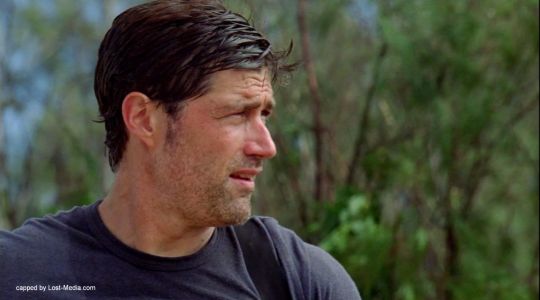#ana-lucia cortz
Explore tagged Tumblr posts
Text
"The Deconstruction of Dr. Jack Shephard"

"THE DECONSTRUCTION OF DR. JACK SHEPHARD" I have a confession to make. I must be one of the few fans of the ABC series "LOST" (2004-2010) who did not dislike the series' lead character, Dr. Jack Shephard. Before anyone makes the assumption that he is a favorite character of mine, let me make one thing clear. He is not. But for some strange reason, I never disliked Jack. I still do not.
Throughout most of the series’ run, many "LOST" fans had consistently ranted against Jack’s faults. Mind you, he was not the only flawed character in the series. In fact, most of the major characters seemed to possess some very serious flaws. Jack Shephard seemed to be one of very few characters that had drawn a considerable amount of ire from the fans. I do not know why he was been specifically targeted by these fans. But I cannot help but wonder if the combination of Jack’s role as the series' lead character and his flawed personality had set fans against him. Now, someone might claim that my last remark sounds ridiculous. As I had earlier pointed out, most of the major characters are also seriously flawed or have committed some serious crimes. Extremely flawed characters like John Locke, Jin Kwon, Michael Dawson, Kate Austen, Miles Strume, Ana-Lucia Cortez, Charlie Pace, Sayid Jarrah, James "Sawyer" Ford, Sun Kwon, Boone Carlyle, Mr. Eko, Juliet Burke and Shannon Rutherford. Hell, the list was practically endless. And yet, the only other character who had received as much criticism or hate as Jack was Ana-Lucia Cortez. Why? Well, I have my theories. Both Jack and Ana-Lucia had assumed leadership among the castaways at one time or the other, due to their personalities, circumstances and professions. Ana-Lucia assumed leadership of the Tail Section passengers that crashed on one side of the island and remained stuck there for forty-eight (48) days. Since Day One of the Oceanic 815 crash, Ana-Lucia had stepped up and utilized her skills as a police officer to save lives and make decisions when no one else would. Jack, a spinal surgeon, did the same with the surviving passengers from the Fuselage Section on the other side of the island. In one early Season One episode, (1.05) "White Rabbit", he seemed willing to back away from the role of leader, until John Locke convinced him to resume it. Jack remained the leader even after Ana-Lucia and the remaining Tail Section passengers joined the Fuselage camp by the end of Season Two’s (2.08) "Collision". And it was not until after his departure from the island in the Season Four finale, (4.13/4.14) "There's No Place Like Home, Part II" with Hugo "Hurley" Reyes, Sun Kwon, Sayid Jurrah, Kate Austen and Aaron Littleton (the Oceanic Six) that he finally relinquished the position. Recalling the above made me realize something. Human beings – for some reason or other – expect leaders to know everything and always do the right thing. Always. And without fail. Humans seemed to have little tolerance toward the imperfections of our leaders. This certainly seemed to be the case for fictional characters who are leaders. And many fans of "LOST" had harbored a deep lack of tolerance toward Jack and Ana-Lucia’s personal failings. In the case of the former L.A.P.D. police officer, many fans had complained of Ana-Lucia's aggressive personality. They also accused her of being a bitch. In other words, being aggressive and hard – traits many have claimed are more suited for a man - is a sure sign that a woman is a bitch. And unlike other female characters on the series, Ana-Lucia lacked the svelte, feminine looks prevalent in productions such as the 2001-2003 "LORD OF THE RINGS" saga. Actually, gender (and racial) politics may have played a role in the fans' opinion of Jack. His main crime seemed to be that he did not fit the image of a heroic leading white male character. Physically, he looked the part. Unfortunately for Jack, he had failed to live up to those looks. He made the wrong choices on several occasions – choices that included his decision to continue Daniel Farraday's plan to set off the nuclear bomb Jughead in the Season Five finale, (5.16/5.17) "The Incident". It is interesting that many fans had dumped most the blame upon Jack’s shoulders regarding that bomb. And he was partially to blame. But those same fans had failed to remember it was Daniel Faraday who had first insisted upon setting off the bomb to reset time back to the day of Flight 815’s crash – September 22, 2004. And they also failed to recall that Dr. Juliet Burke's decision to set off the bomb for her own reasons was the final action that led to her death. Many had accused Jack of failing to be a proper parent figure to his nephew, Aaron Littleton, during his three years off the island. And at the same time, many had praised Kate Austen for pretending to be the boy’s mother. I found this rather perverse and a little disgusting, considering that Kate had set in motion the lie about her being Aaron’s mother. Jack (along with the remaining members of the Oceanic Six) was guilty of supporting Kate’s lie. But instead of criticizing both for lying about Aaron and keeping him from his Australian grandmother Carole Littleton for nearly three years, many fans had criticized Jack for not being an effective father figure to Aaron and praised a kidnapper like Kate for being a good mother. Ah, the ironies of life. Many fans had accused Jack of being emotionally abusive toward Kate. And yes, they would have every reason to criticize his behavior in episodes like (1.11) “All the Best Cowboys Have Daddy Issues”. But Kate’s own behavior in episodes like (1.12) “Whatever the Case May Be”, which featured her constant lies and attempts to manipulate him and others, occasionally triggered his temper. If one character is going to be criticized for the situations I have previously described, the other character involved should be criticized for his or her own questionable behavior. Some of Jack's other mistakes included sanctioning Sayid’s torture of Sawyer, failure to organize a genuine search for the only child passenger from Oceanic 815′s Fuselage Section, the kidnapped Walt Lloyd, instigating that ludicrous search for Walt’s dad Michael Dawson and communicating with Martin Keamy and the other hired mercenaries aboard the S.S. Kahana. Yet, he had received more complaints about his relationship with Kate, along with his tendencies to get emotional and shed tears than for anything else. Once again, many “LOST” fans managed to prove that we still live in a patriarchal society. It was okay for female characters to shed tears in very emotional moments, but not male characters. Especially if that one male character happened to be the series’ leading character. Jack's penchant for tears was not the only sign of how some fans can be hypocritical. I have written articles criticizing some of the series' other characters. Most of my articles have criticized Kate Austen. I will be honest. I used to dislike Kate very much. However, my dislike of her has finally abated - somewhat. Most of my dislike had stemmed from her past flaky behavior and especially from the fans’ tendency to excuse her mistakes and crimes . . . or pretend that she had never done anything wrong. However, Kate was not the only character given this leeway. James “Sawyer” Ford had murdered three people – one in Australia and two on the island - within a space of two to three months. Yet, many fans had made constant excuses for his actions. I never disliked Sawyer. But I have complained about his flaws, mistakes and crimes on numerous occasions. When I did, many fans had pretended that he had done anything wrong. And to this day, I still find this frustrating. Sometime back in Season Two or Season Three, actor Matthew Fox and the show’s producers, Carlton Cuse and Damon Lindelof, made it known to the media and viewers that they were doing something different with the Jack Shephard character. They took a superficially heroic type – a brilliant surgeon that assumed leadership of a group of stranded castaways – and deconstructed him. In other words, they slowly but surely exposed his flaws and took the character to what could be viewed as the nadir of his existence. Jack eventually climbed out of that existence by the series’ last season. But certain fans on many "LOST" message boards and forums made it clear this was not a path they had wanted Jack to take. Instead, these fans had wanted – or demanded that Jack behave like a conventional hero. During most of Season Six, Jack had managed to avoid indulging in self-destructive behavior. He also refrained from displaying any inclination to pursue a romance with Kate. The worst he had done was engage in a temper tantrum over his discovery that the island’s spiritual "man" Jacob had been observing and possibly interfering in the lives of several castaways. Another personality change I noticed was that he had passively allowed others to take the lead without questioning their decisions. I must be honest. I never liked that particular period in Jack's emotional makeup. It made him seem like a mindless moron. Did Jack finally become the hero that so many had demanded, when he saved the island in the series finale? Apparently, those responsible for the Emmy nominations believed he had. Why else did they finally nominate Matthew Fox for a Best Actor in a Drama award, after the series' final season. Mind you, Fox had been giving outstanding performances since the first season. But when Jack finally became a likable and somewhat conventional hero, they deemed Fox worthy of an Emmy nomination. Dear God. Personally, I never did care about Jack Shephard's status as a hero. Nor did I really care for his passive behavior in Season Six. But I did hope that he had finally discovered some inner peace for himself. And I believe that he did during the series’ final moments.

#LOST#lost abc#lost tv#jack shephard#matthew fox#carlton cuse#damon lindelof#kate austen#Evangeline Lilly#walt lloyd#malcolm david kelley#michael dawson#harold perrineau#james sawyer ford#josh holloway#ana-lucia cortz#michelle rodriguez#sayid jarrah#naveen andrews#sun kwon#yunjin kim#hurley reyes#jorge garcia#aaron littleton#daniel faraday#jeremy davies#dr. jack shephard
61 notes
·
View notes